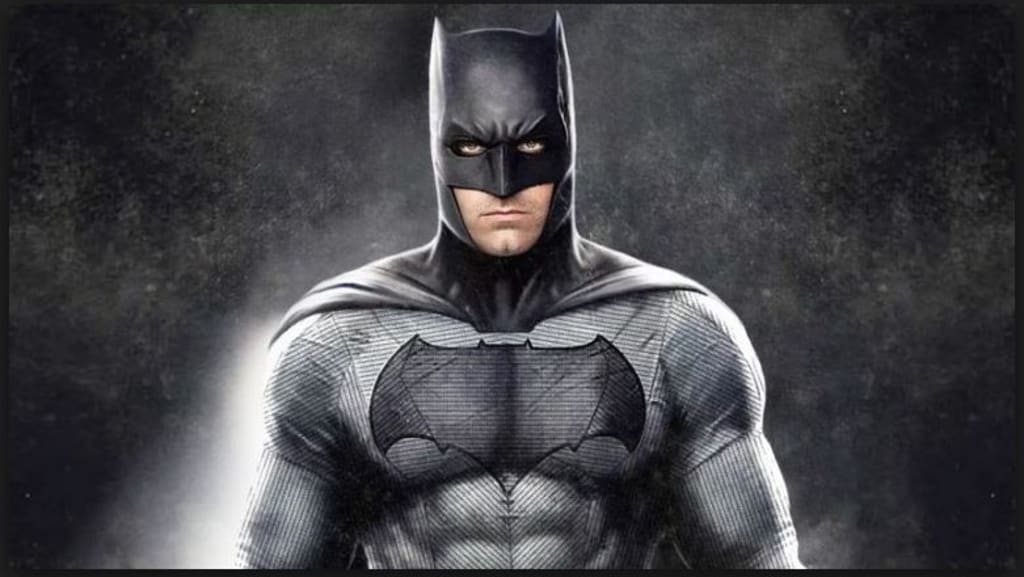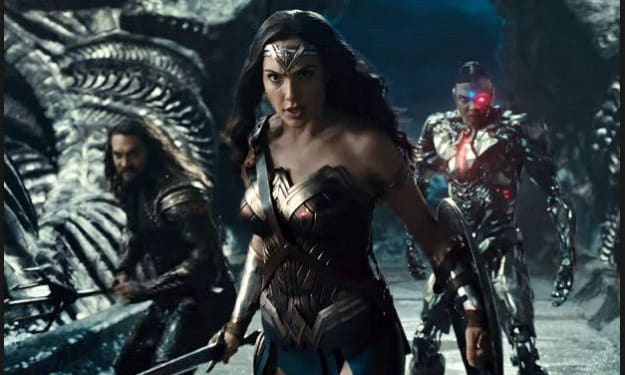Why Ben Affleck Is the Best Batman...So Far
A Look at the History of the Cinematic Dark Knight and How It Lead Us Here

Why Ben Affleck’s Batman might be the most important Batman EVER…
I fully understand that the title of this piece alone is extremely devisive but hear me out. This is a Batman we have not seen on the big screen until now, and a lot of has to do with the creators giving Batman a universe in which to work. To better put that in perspective, let's first look at the versions of the caped crusader that have graced the theatres.
In 1943, we had Batman released by Columbia pictures, which had the titular hero played by Lewis Wilson with Douglas Croft as Robin and facing off an evil Japanese scientist. This plot was ripped right from the era, given that the U.S.A. was embroiled in WWII, the threat played very much on what America was dealing with at the time.
1949 brought us Batman and Robin again through Columbia Pictures this time with Robert Lowery as Batman with Johnny Duncan taking on the Robin role. With different actors the second film could be considered a stand-alone production or incorporated into the same cinematic universe as the film from six years earlier, but this is never addressed. Given that this was a post war film they could take a little more liberties with the plot and threw the dynamic duo against a hooded villain named “The Wizard,” played more as a mystery.
Both films have important input in what comes later, just wait.
1966 brought a new era to the live action Dark Knight with Adam West taking on a much more “fun” character. Silly and campy are the order of the day in both the theatrically released film and the television series it was tied to, and both of these concepts would play a significant role in the films to follow.
In 1989 we got Tim Burton and Michael Keaton coming together to bring us Batman, with Batman Returns and starting off a loose anthology of films which helped shape the character for generations. The first two films featuring Michael Keaton as Batman brought the “dark” back to the Dark Knight, with almost all the action taking place under the cover of night, with Batman beating up common criminals and outright murdering casual henchmen and doing very little to stop the deaths of two major villains, the Joker and Penguin. Most would honestly argue that neither of these characters had any redeeming value and while Batman didn’t actually kill the major villains, he did shove a bomb down one henchman’s pants, and then torched another with the afterburner on the Batmobile. This part of the series did something very interesting with Bruce Wayne in that they made him an awkward recluse. He was not comfortable in the spot light and despite being one of the most famous names in Gotham City, in the first film one of the long standing reports of the local newspaper had no idea what Bruce looked like. This makes sense if Bruce is an emotionally tortured individual who has spent the better part of his life building his arsenal to fight crime. In second film Bruce is more public and actually shows up to business meetings but is still the kind of guy who no one bats an eye when he doesn’t show up for some major event.
With 1995’s Batman Forever being directed by Joel Schumacher and Batman played by Val Kilmer, the franchised backed off the casual homicide and brought back the color and campiness of the 1966 era, which for better or for worse made the films very memorable. If you were channel hopping and caught one of the movies, you knew instantly this was a Joel Schumacher Batman flick. This isn’t to say that all the villains got out alive. In Batman Forever the character Two-Face plummeted to his presumed death when Batman distracted him with multiple coins (it makes sense in the film) and scrambles Riddler’s brain.
1997 brought the final film for the anthology and ended the cinematic life of the character for several years due to poor reception and box office performance, Batman and Robin, ironically the same title that closed out Columbia Picture’s Batman franchise nearly fifty years prior. This had Batman and, obviously Robin team up with Batgirl to battle Mr. Freeze, Poison Ivy, and Bane. On paper this should have been an at least interesting movie. While visually stimulating the film brought out a lot more casual humor and campiness that didn’t sit well with the fan base and resulted in Warner Bros scrapping plans for a fifth film. Both star George Clooney and director Schumacher have issued apologies for the final product, which admitted was not a great film but at least you could have some fun watching it with friends. Part of the focus on this film was the banter between Batman and Robin, which gave us a character that, while respecting the caped crusader, didn’t always like him or agrees with his decisions.
Batman would not return to the silver screen until 2005’s Batman Begins which had Christopher Nolan take over the director’s chair and Christian Bale don the cape and cowl. This film gave us a detailed account of how Bruce Wayne went from scared child clutching his dead parents to crime fighting vigilante. This film also featuring the gradual rise to power of Jim Gordon, and it’s important to bear in mind this is a total reboot, not a prequel to the 1989 version. Some of the confusion came from the fact that while the last two films had Batman adopt gradually less dark costumes, 1989’s version had an all-black suit. Batman Begins shows us the evolution of a black costume Batman, which led to some questioning if we are seeing how we got to the events of the 1989 film. This also came on the heels of a certain science fiction franchise doing prequels to their own, more famous stories so in retrospect, confusion was understandable.
Batman Begins kicked off a new trilogy which was picked up by The Dark Knight, which has been declared by many to be the best superhero film of all time. I’m not saying it’s not a great film, but from my own point of view, the first two films of the trilogy felt more like crime dramas that happened to have a superhero in them rather than superhero films. Batman’s presence in costume felt incidental to the story itself, as though you could omit the “Batman” aspect and still have a solid action-thriller.
The third film in the series, The Dark Knight Rises, broke this thread by having a very odd feel to it. On one hand it could have been a pre-apocalyptic thriller, as though showcasing how we start to get to a dystopian future but having Batman pull of stopping it at the last second. Part of it was a crime thriller, but not enough to feel connected to the first two films. There were also several plot points that didn’t really gel if you gave them even a passing glance. For instance, Bruce Wayne is bankrupted when terrorists break into the stock exchange and do some fancy computer work to reallocate all of his money. This didn’t make any sense even as you watched it because there is no way anyone would honor business deals done by terrorists who are breaking in, holding hostage, and performing the criminal act all on camera. That kicked off a lot of moments in the film that felt forced and showed that the franchise was getting tired.
This brings us, after all that, back to Ben Affleck taking on the role of Bruce Wayne and Batman in 2016’s Batman v Superman: Dawn of Justice, which if you follow me as a writer, you know I’ve talked about A LOT. What they did with Ben’s Batman was bring a lot of these elements set down all the way back in 1943 and mix them together into a new, more complete Batman. Dawn of Justice brought us a nigh-paranoid Batman who was focused on how an unknown alien whose debut destroyed half of Metropolis was a foreign threat that existed in a world of government and corporate corruption and terrorist activity. These were the headlines of the day (and as of this writing still are) making Batman a very topical character, ala 1943. He’s a loner, who should be known to the public in his Bruce Wayne persona, but isn’t recognized by the newer reporters as Clark Kent has no idea who he is despite his status as the golden child of Gotham City. This pulls from the 1989 era, as well as Batman’s habit of abjectly shooting down and running over henchmen by the dozens. We see a Batman who’s 20 years into the game so he’s tired and jaded and cranky. Okay, well he tries to outright murder Superman because Superman accidentally wrecked his building and he’s had bad dreams so “cranky” feels like a understatement.
Justice League, however, rectifies some of this. Now driven by intense, and well placed guilt, he finds himself on the front line against an full alien invasion. We see here something that was touched on in The Dark Knight and the 1989 film, Batman being a detective. He’s tracking down leads, pulling files, digging into any resource he can to find answers. You know, like a detective. He also takes control of his technology, with no hints at a Lucius Fox in this universe, he’s the one working on the team’s transport and riddling out tech to help him fight the aliens. He also has a hint of the 1966 and the Schumacher humor, cracking jokes and occasionally getting flustered with Alfred and the team, even pointing out some of the absurdity of their situation.
What sets the Affleck Batman apart however isn’t the culmination of these elements but rather the inclusion of something straight from the comics. He’s willing to make the hard decisions at a moment’s notice, even if that runs the risk of getting people killed. He has a “big picture” sensibility and while he may regret the lives lost, he will make the call. He understands that, for this problem, he’s going to have to put people in the line of fire, whether they are combat ready or not. He also brings a self-awareness to the character, in his dialog with Alfred where he admits that Superman is more human than he is. He states that Superman fell in love and held down a job, lived a human life while he, Batman, focused only on his war on crime.
Its these added elements to the character that, while they may make him a man of gray areas, also make him more relatable by highlighting how he has trouble relating to other people. His relationship with the League is one that he’s still clearly figuring out; are they friends or co-workers? What are even friends to a guy like Bruce Wayne? This circles back and borrows from the Keaton era, that awkwardness.
Love him or hate him, Ben Affleck and the team of writers brought to life probably the most complete Batman we’ve ever seen on the big screen, and to breathe new life into a character that’s been around since 1939, that says a lot.
Thanks for reading.
Batman and all related characters are the property of DC/Warner Bros.
About the Creator
Michael Bauch
I am a writer with a wide range of interests. Don't see anything that sparks your fancy? Check back again later, you might be surprised by what's up my sleeve.
You can follow me on Twitter @MichaelBauch7






Comments
There are no comments for this story
Be the first to respond and start the conversation.